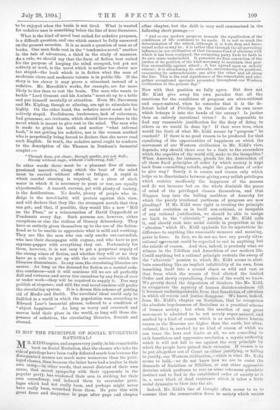IS NOT THE PRINCIPLE OF SOCIAL EVOLUTION RATIONAL P M R.
KIDD argues, and argues very justly, in his remarkable book on Social Evolution, that the classes who take the side of privilege have been really defeated much less because the disorganised masses are much more numerous than the privi- leged classes, than because the'latter have had a traitor in their own camp,--in other words, that secret distrust of their own cause, that secret sympathy with their opponents in the popular party, has weakened their arm in striking for their own ascendency, and induced them to surrender privi- leges which had not really been, and perhaps might never have really been, wrenched from them. He puts this with great force and eloquence in page after page end chapter after chapter, but the drift is very well summarised in the following short passage :— "and so our modern progress towards the equalisation of the ' conditions of life continues to be made. It is not so much the determination of the attack, although it is both firm and deter- mined as far as may be ; it is rather that through the all-pervading influence in our civilisation of that immense fund of altruism with which it has been equipped, the occupying party finds its faith in its own cause undermined. It possesses no firm conviction of the justice of its position of the kind necessary to maintain that posi- tion successfully against attack ; it has agreed upon an orderly retreat ; it is abandoning its outworks, surrendering its positions. evacuating its entroneaments one after the other and all along the line. This is the real significance of the remarkable and alto- gether exceptional spectacle presented. throughout our Western civilisation at the present day."
Now with that position we fully agree. But does not Mr. Kidd give away his own paradox that all the sanctions for the conditions of progress are ultra-rational and super-natural, when he concedes that it is the de- ficient belief of Privilege in the justice of its own cause which betrays it into the hands of the enemy ? Is justice then an entirely unrational virtue ? Is it impossible to find any reasonable justification for the duty of doing to others as we would be done by ? If that were true, when would the limit of what Mr. Kidd means by " progress " be reached P If there is no good reason to be produced for that equalising of the opportunities of happiness on which the movement of our Western civilisation in Mr. Kidd's view, depends, why should there ever be a limit to the surrenders which the capables of the world will, make to the incapables P When Anarchy, for instance, pleads for the destruction of all those fixed principles of order by which society is kept back from committing suicide, ought the guardians of order to give way ? Surely it is reason and reason only which helps us to discriminate between giving away selfish privileges which restrict needlessly the happiness of the masses and do not increase but on the whole diminish the peace of mind of the privileged classes themselves, and that Niagara leap into the boiling cauldron of Anarchy for which the purely irrational partisans of progress are now pleading? If Mr. Kidd were right in treating the principle of social evolution as in itself non-rational, as incapable of any rational justification, we should be able to assign no limit to the " altruistic " passion as Mr. Kidd calls it, and should rush into social suicide in proportion as the "altruism" which Mr. Kidd applauds for its mysterious in- difference, to anything like reasonable measure and meaning, gains in force, In fact, we do not see how any purely ultra- rational u*vement could be expected to end in anything but the suicide of reason, And that, indeed, is precisely what we witness in the Nihilism and Anarchism of our modern life.
Could anything but a rational principle restrain the sweep of the "altruistic" passion to which Mr. Kidd seems to attri- bute something like an implicit infallibility of its own, from launching itself into a second chaos as wild and vast as that from which the reason of God elicited the limited Order and slowly crystallising Justice of the world we know. We greatly dread the disposition of thinkers like Mr. Kidd, to exaggerate the mystery of human disinterestedness till it becomes undistinguishable from that fanaticism of altruism in which all reason and justice disappear. We know, indeed, from Mr. Kidd's chapter on Socialism, that he recognises the absolute hopelessness of Socialism as a practical scheme of human society ; but when the sanction of any great movement is admitted to be not merely super-natural, and marked by a kind of reason which is as much above human reason as the Heavens are higher than the earth, but ultra- rational, that is, marked by no kind of reason of which we can trace the laws and limits at all, we are conceding to rash fanaticism and aggressive revolution a mystic authority which it will not fail to use against the very principle by which the people have gained their victories. If reason is to be put altogether out of Court as either justifying, or failing to justify, our Western civilisation,—which is what. Mr. Kidd seems t6 hold,—we do not know how we are to resist the demands of Socialism or Nihilism, or any other aggressive doctrine which professes to rest on some vehement altruistic instinct and to find in the established order of society as it is, a mere block of dead resistance which it takes a little social dynamite to blow into the air.
Indeed, Mr. Kidd's line of thought often seems to us to assume that the conservative force in society which resists
wanton destruction, should be just as helpless when it comes into collision with such a fanatical movement as that for instance of the modern Nihilism, as it was when it stood in the way of that popular Liberalism of which he magnifies the triumphs. Yet what is the difference, and as we con- ceive the sole difference, between the triumphs over privilege which Mr. Kidd commemorates and which, as he justly says, were obtained because the partisans of privilege felt the ground crumbling under their feet, and the triumphs over Socialism, not only achieved hitherto, but likely to be main- tained as long as human society holds together, by the partisans of individual ownership,—except that Privilege had not Reason in its larger sense, on its side in the former case, while the principle of individual property, properly understood, had and has Reason in the larger sense, on its side in the latter case ? We deny that Mr. Kidd is right in regarding what he calls the "altruistic" prin- ciple of Christianity as ultra-rational. It is because the reason of man does sanction the undermining of privilege, and does not sanction the substitution of Socialism for individualism in respect to the institutions of human society, that Liberalism has succeeded in abolishing so many privileges, and has not succeeded and will not succeed in abolishing the individualistic basis of modern society.
As we understand Mr. Kidd's book, he uses the term reason in a far too limited sense. No doubt reason involves good reasoning, but it involves much more than good reasoning. It involves good reasoning on the basis of a large view not only of what human nature now is, but of what tends to raise it in the scale of social morality without sapping the sources of individual strength. He speaks constantly, as we remarked last week, as if reason justifies and must justify pure selfish- ness. Human reason surely takes its stand on the whole nature of man, on the conscience and the affections, as much as on those individual ambitions and energies which so often seem to come into conflict with the conscience and affections. And it takes its stand not only on human nature as it is, but on those moral tendencies in human nature as it is which seem to be elevating and purifying the human character and guarding it against degeneration. While we agre3 heartily with the tendencies of Mr. Kidd's view of social evolution, we hold that he has made a great mistake in contrasting so sharply the altruistic principles which all religions more or less, and Christianity most of all, ingraft on the nature of man, with the natural selfishness of that nature. No doubt revelation takes up and emphasises and cherishes all that is disinterested in our nature, and developer it far beyond the point to which it could ever have reached without the help of revelation. But it works on what it finds already in us, and does not introduce any purely alien matter. Nor is Christianity half as favourable to what we may call unmitigated altruism as Mr. Kidd supposes. It is at least as ascetic as it is altruistic. It impresses even more powerfully the duty of eradicating sin in our- selves than it impresses the duty of relieving the suf. ferings of others. The " sweet reasonableness " of Chris. tianity becomes very stern reasonableness when it deals with the various hungry cravings of human nature for unlimited delights, whether of the senses or the intellect, and finds it necessary to subdue them to the standard of the imperious Christian conscience. In our belief, it is quite a mistake to isolate the altruistic emotions as if they were the main substance of Christian culture. Self-control and self- repression were even more characteristic products of the religion of the Middle Ages, than pure willingness to suffer in order that others might enjoy. The reason, as we conceive it, why Socialism will never triumph over individualism is that the conscience is strictly individual, and that you cannot compress men into a society-unit without extinguishing this individual conscience. If privilege has yielded inch by inch to the attack of the unprivileged masses, it is because the conscience has been on the side of the attack, and not on the side of the defence. And so soon as the conscience finds itself on the side of the defence of individualism against the arrogance of the democratic attack, it will be the democracy which will be undermined by the selfishness of its own passions, just as the French Revolution was undermined by the vindictiveness and wilfulness of its own passions, in spite of its having had at one time the great majority of the French people and all the nobler of the popular war-cries on its aide,



































 Previous page
Previous page